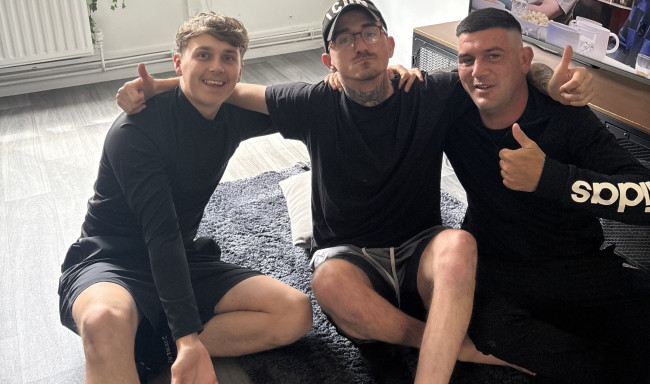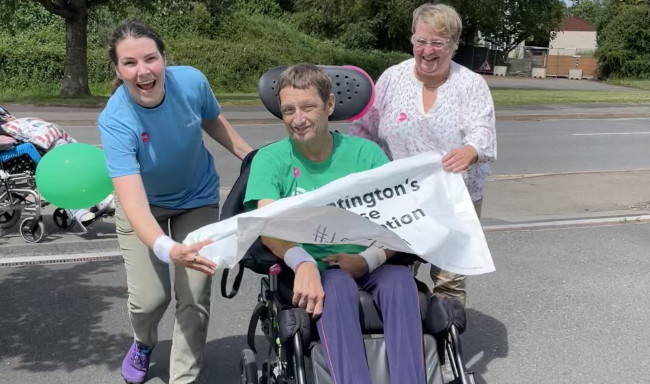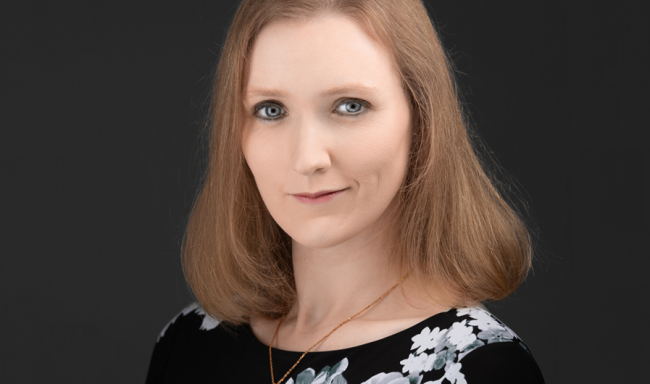Hannah shares her experience of working with occupational therapists and speech and language therapists to help support her husband.
Knowing when the right time to seek professional intervention can be difficult. It can also lead to frustration if not seen in time due to long waiting lists. From Hannah's experience, she said accessing support earlier was beneficial and also seeking advice from the Huntington's Disease Association and others within the community.
Can you tell us a little bit about Huntington’s journey?
"Stuart was diagnosed with Huntington’s disease in January 2017. We got married the same year and have since adapted and changed quite a lot as a family. Stuart’s symptoms are now very obvious, he requires a lot of support with daily living and is lucky to have a group of regular carers who visit every day whilst I am working. His movements and stability are impaired, and needs guidance when out in the community as he can quickly become disoriented. Eating and speaking have become a more recent struggle. Stu now requires one-to-one support when eating as it’s unsafe to be alone when consuming food as choking is now a daily occurrence. His speech is often slurred, but by being patient and supporting Stu with his vocabulary, he can form his sentences much better."
When did you first realise you needed to seek professional interventions for Stuart?
"Stuart from the early stage of his diagnosis required some low-level support with walking as his movements and gait had quickly changed. We were very lucky, that upon diagnosis he was provided with an occupational therapy (OT) assessment, which meant we had to move house as an adapted home was required. We now have a home, which has a through-floor lift, ramp for easy access to the property and a wet room. These changes have been brilliant in supporting Stu to remain independent, he only requires help when having to use complete fine motor skills such as buttons and zips on clothing, also personal care such as cutting nails and shaving. I now complete these tasks for him. Christmas 2023 it became obvious that he required some support from a speech and language therapist (SALT). We were able to speak to his consultant based at the Southmead Hospital Brain Centre, and a referral was requested."
His speech and eating were clearly affected by his Huntingtons. He is now currently under investigation after a short wait for an appointment and awaiting a videofluoroscopy so we can work out what consistency he can handle and how to actively help his eating and speech.
How was your experience with your speech and language therapist?
"From diagnosis, Stu received an appointment, but this was seven years ago, and at the time his eating and speaking were still manageable. They equipped Stu with a memo card to “slow down” when eating though if I’m honest this made no impact, so we provide verbal prompts and guidance when he’s eating so he remembers to slow down. About nine months ago we started to see significant changes that needed more input from professionals. Whilst at his clinic appointment this year it was really helpful that the SALT were present and were able to understand my concerns, they put in a referral straight away to the team closer to our home address. Within weeks Stu had his first appointment where they too understood my concerns, and are now investigating how we can support Stu to eat and speak safely. Stu has already made advanced plans and doesn’t wish to have a gastrostomy feeding tube (PEG feeder), the team fully understood this so we are now awaiting investigations so we can assess how to support him going forward."
Could you tell us about your experience with your Occupational Therapist?
The initial assessment Stu had, when he was diagnosed over seven years ago was really good, they identified so much that I wasn’t even aware was needed. We worked out that Alexa was our new best friend, we set reminders for medication and significant events which were due to happen so he could be reminded.
"They identified we needed a lot of adaptations, and so supported our need to move house. We were able to move into a home which had a lift, wet room, ramps and even a heavy duty toilet seat as Stu was constantly breaking ours. They provided a walker also, but we found this was more of a hazard than a support so thanks to a good friend was provided with a mobility scooter so he can access the community safely. All of these have had a positive impact to Stu's life, it provided him with so much more independence and had a great impact on his mental wellbeing. Unfortunately we’ve seen a lot of change with Stu recently and do need a re-assessment regarding his care, furniture and medical devices, but due to demands in the service, we are still awaiting their response. Sadly there is no time frame, which right now is hard to deal with as some level of help and support is really needed in all areas of his life now."
Do you feel that you have had the professional interventions at the right time and is there enough information about when and where to get the help from?
"Honestly, No. It’s not there when we need it and sometimes is a tad too late. But thankfully Stuart’s recent clinic appointment has definitely helped the situation. The speech and language therapists have been quick to respond to the referral but the occupational health one is still too long. He’s really struggling without aids or ideas on what to use next to help aid his mobility and independence. I hope though that it will be assessed soon, and he can have some changes made to his daily living which will help improve or at least support his recent changes due to Huntington’s disease. I have been very thankful though to be able to seek advice from peers in the Huntingtons circle and also our local adviser which has helped a lot, so I’ve been really grateful for the help we have received."
What advice would you give other carers/family members who are just starting their Huntington’s journey?
"Seek the support from peers in the Huntingtons community, trust me those friends you connect with through Huntington’s disease are the ones you make for life. There is so much understanding and knowledge that you can gain from just speaking to other families affected by Huntington’s. In terms of speech and language, I recommend you seek advice from the GP and the Huntington’s Disease Association as soon as you notice a change. It helps massivley to be ahead, so when there are any problems you’re already one step ahead. Again, I’d say the same regarding occupational therapy assessments, accept any support you can because having a team who understands your needs is paramount. The help we gained at the start of Stuart’s diagnosis seven years ago, is definitely helping support his daily living now."
Never think you're accessing help too early, the Huntington’s Disease Association and the wider community are your biggest asset in getting the right support for your loved one.
Thank you to Hannah for sharing.
Professional support
Once you or your loved one starts to display symptoms it can be difficult to know who can help and at what stage. We have broken down the healthcare professionals that may need to be accessed depending on what symptoms are affecting you or your loved one.



